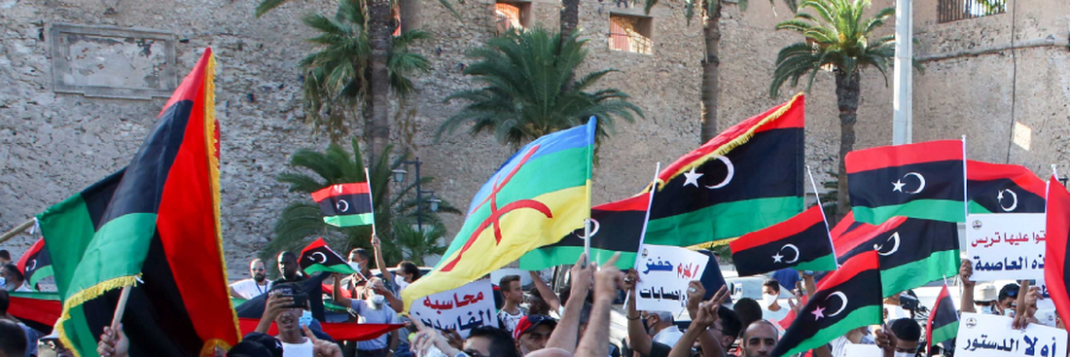By Dr Andreas Krieg & Anas El

 The 2020 US Presidential Elections are en route to become the most contested and potentially the most controversial in American history as President Trump has repeatedly refused to commit to a peaceful transfer of power.
The 2020 US Presidential Elections are en route to become the most contested and potentially the most controversial in American history as President Trump has repeatedly refused to commit to a peaceful transfer of power.
Beyond its effect locally on US democracy, it could have far reaching geopolitical effects beyond its own borders, to conflicts in the Middle East where the UN has repeatedly failed to mediate solutions; where foreign weapons flow; where fighters flood the battlefield breaking ceasefires; and only the United States remain as an arbiter.
Despite America’s arguable decline as a true superpower, the US’ global stature has created a need and at times a necessity to enter the most fiercely contested battles and conflicts, often doing the quiet but heavy lifting of peacebuilding in the process.
However, in the event of a major domestic political dispute and upheaval, rival powers seeking to further its decline, or regional powers seeking to take advantage of the US’ decline, may seize the opportunity and undermine US interests in the MENA region.
In addition to its already struggling electoral machinery, America has been hit hard by COVID-19, faces an unparalleled polarization of a highly divided nation, and has to deal with an incumbent President not only seemingly in denial of facts but also acting in potential disregard of the US Constitution, political conventions and, first and foremost, the principle of a peaceful transition of power.
On record President Trump has repeatedly refused to commit to a peaceful transfer of power – something many, including Democratic contender Biden, have so far dismissed as just another example of Trump’s often ill-informed rhetoric.
Yet, the scenario of Trump not conceding defeat could push the United States into an unknown constitutional crisis given the levels of political polarization across the country and the opaque nature of America’s mediated electoral system.
How long could this last?
If margins between both candidates are close, the results announced on election night of November 3rd could be meaningless, as America is most likely not going to have an election day but an election week, if not an election month.
With a deluge of mail-in ballots only counted after election night, the preliminary results from those who went into the many polling stations around the country that day, might trigger what some Democrats call a ‘red mirage’, namely the illusion of critical swing states turning red.
Trump might declare himself victorious, despite the fact that the millions of predominately Democratic mail-in ballots are likely to shift the electoral balance in Biden’s favour.
This will seriously test the character of the candidates, and the resilience of American democracy.
In a world where narratives and perceptions weigh heavier than facts, all Trump has to do is cast aspersions and doubts over the authoritativeness of the results and mobilize legions of lawyers ready for litigation in battleground states.
Rejecting the legitimacy of the results built on existing narratives around the myth of voter fraud, victimizing himself and the GOP at the hands of ‘liberal elites’ trying to ‘rig the election’, would have far worse consequences than the Bush vs. Gore case in front of the Supreme Court following irregularities in counting Florida ballots in 2000.
Unwilling to concede, Trump, unlike Gore, will likely see the legal fight through; a move which is going to exceed the interval period of election day and inauguration on 20 January 2021.
The domestic effect on a deeply divided nation could be devastating. With thousands mobilized by what some see as a reckless incumbent, a constitutional crisis (amid an out-of-control pandemic) could trigger a clash over truth and narratives between Trump- and Biden-supporters that may not be confined to social media.
It could spill over to the streets and lead to scenes of violent protest that could match or exceed the Black Lives Matter protests over the murder of George Floyd earlier this year.
A transition period marred by conflict and potentially lasting months could lead to a domestic and foreign policy paralysis as Washington’s institutions are consumed dealing with the socio-political unrest domestically. American foreign and security policy would be on autopilot.
What about Libya?
One specific effect could be on Libya. Biden and Trump share different views of the Middle East.
The region has experienced extraordinary change from the Gulf to Israel and Palestine, in addition to North Africa since Trump’s election in 2016.
Despite Trump’s reluctance to become embroiled in Libya, the US has played a quiet but pivotal role in exercising its diplomatic leverage in recent months in order to revive peacebuilding efforts there.
Libya is one of the most fiercely contested conflicts in the MENA region, with local political rivals and regional powers squaring off against one another.
Since April 2019, Libya has been in the midst of a difficult conflict sparked by rogue general Khalifa Haftar and his self-styled Libyan Arab Armed Forces (LAAF) who attempted to overthrow the UN backed Government of National Accord (GNA).
Haftar sought help from the UAE, whose de-facto leader, Crown Prince Mohammad Bin Zayed sought to influence the Trump administration to back Haftar’s offensive whilst they delivered weapons and drones.
The US’ calculus changed as Russia, in coordination with the UAE, delivered their infamous mercenary corps – the Wagner group – alarming the US, which now stood back.
In response, the GNA turned to Turkey, which also delivered mercenaries and drones to defend the UN-backed government.
Despite announcing a ceasefire, the conflict resumed in Tripoli in January 2020, before reaching a stalemate and standoff around the central Libyan city of Sirte, where the GNA and Turkey squared off against the LAAF, the UAE and Russia.
After years of American disregard of Libya, Washington has performed a major diplomatic U-turn on Libya since July and began leading efforts of conflict resolution, largely spurred by fears of a Russian military presence along the southern Mediterranean.
With US leadership from behind, the UN has recently made significant progress and announced a permanent ceasefire in Geneva on October 23rd.
The deal has American concerns over Russia in mind and states that all foreign mercenaries should leave within the next 90 days, i.e. on the very day the next US President is due to be inaugurated.
The permanent ceasefire has opened an opportunity for meaningful progress in conflict resolution after years of protracted conflict, but it will hinge on the UAE’s and Russia’s view of the deal.
Libya could be on the verge of a political deal and unveiling a new government, but make no mistake, this is no reconciliation and divisions remain, which now more than ever are vulnerable to exploitation from both internal and external spoilers.
In the event of a post-electoral crisis in the United States, consuming and paralyzing Washington’s institutions, many of Libya’s spoilers local and international, might feel their actions can go unchecked and unnoticed.
There is currently no other power than the United States who can underwrite a political process and ensure that once it is implemented no spoiler, local or external to the conflict, can undermine it.
A US administration in chaos, with rival claims to the Presidency, cannot send that message, and those unhappy with the deal will take notice.
The EU’s member states are divided over what constitutes stability in Libya, in addition to the broader region. Despite years of public recognition and engagement with the UN-backed GNA, EU member states like France and regional players like the UAE, have worked closely together to cultivate a replacement for Haftar.
Russia, the region’s principal disruptor, is quietly posturing and waiting for opportunities to spoil; seizing more control in Libya as America is otherwise preoccupied.
The Kremlin, going unchecked by Washington, is likely going to refuse to withdraw its guns-for-hire from central Libya for the time being, destabilizing an already fragile permanent ceasefire agreement.
Meanwhile Abu Dhabi could see a window of opportunity closing to improve its own bargaining position along the ceasefire line.
The UAE’s key surrogate force in Libya, the LAAF, may have to concede to a future without its chief Haftar, discredited in the peace process for his unilateral shattering of ceasefires and several coups in the process.
His replacement may not be to the UAE’s taste. Most concerning for Abu Dhabi, however, is the political deal that could see a new Presidential Council being formed that would exercise politically pluralist civilian control over the LAAF. Hence, the UAE might look for opportunities to undermine this political deal.
Haftar himself, just recently cut loose from Abu Dhabi’s umbilical cord, might look for ways to pre-empt his irrelevance to political talks in Geneva by showing he can still win battles on the ground near Sirte.
All that while Turkey, the GNA’s chief backer, might be otherwise preoccupied in the Eastern Mediterranean, Syria and Azerbaijan and overstretched militarily to respond and return the conflict to a balanced stalemate.
The absence of a hegemon in the Middle East has already transformed the region into an apolar environment where a range of medium-sized powers compete with a range of smaller powers to fill the vacuum as non-state actors from militias to terrorists emerge to fill the local governance vacuum.
Therefore, Libya particularly needs America’s full attention in the coming months, where spoilers have so far, with the exception of Russia, kept a low profile so as not to jeopardize American endorsement and goodwill.
Following the old idiom of ‘when the cat’s away, the mice will play’, a protracted period of domestic political limbo in Washington following the US Presidential Elections could offer a range of opportunities for spoilers to spoil.
***
Dr Andreas Krieg, King’s College London.
Anas El Gomati, Sadeq Institute, Tripoli.
___________
DEFENCE-IN-DEPTH .. Research from the Defence Studies Department, King’s College London




